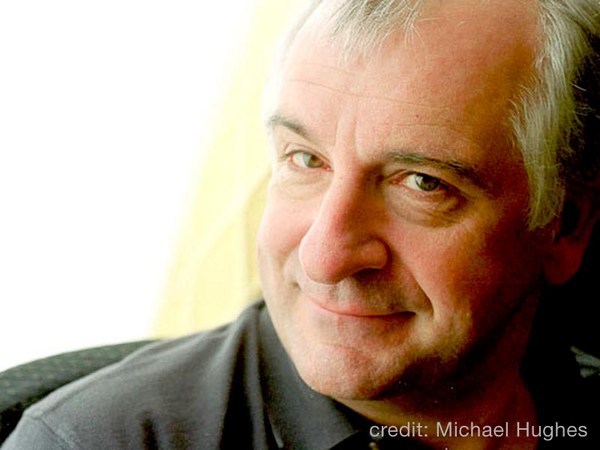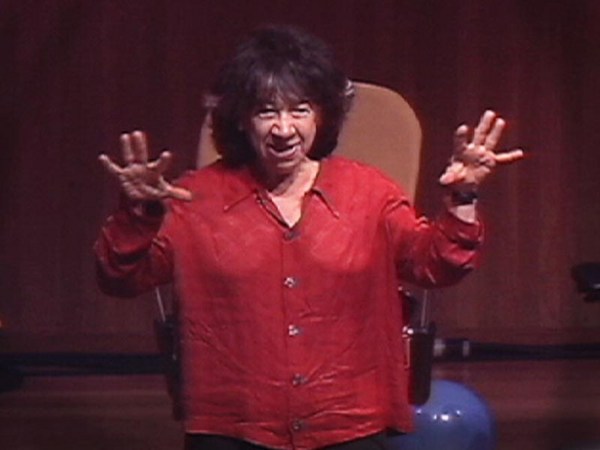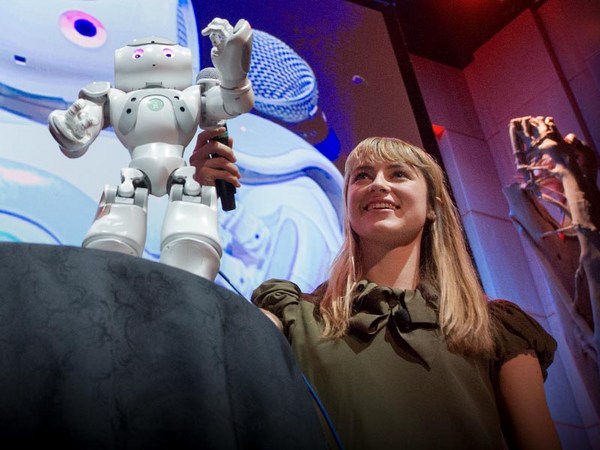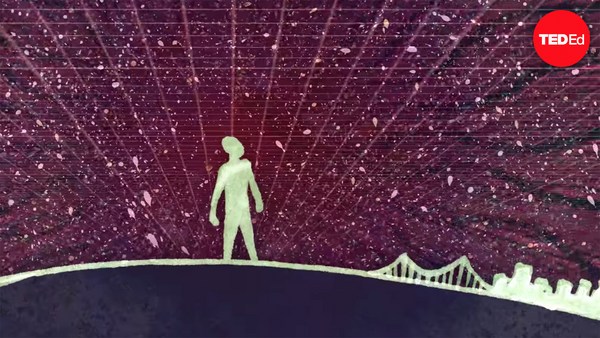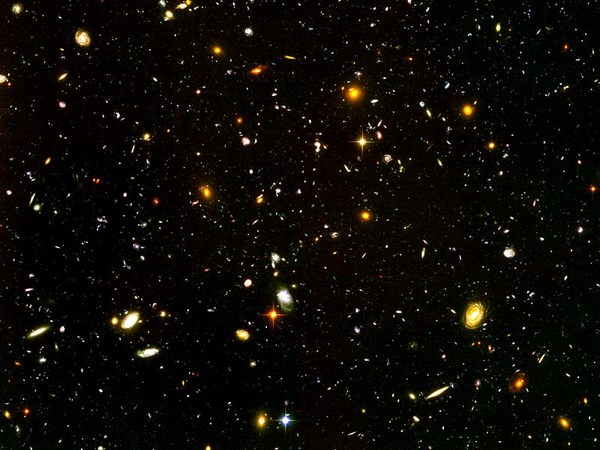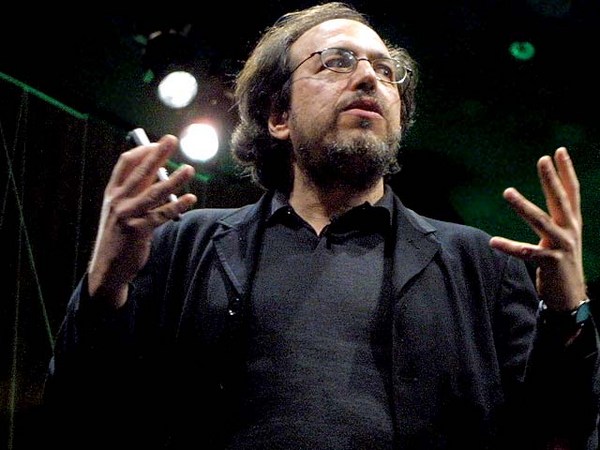I'd like to apologize, first of all, to all of you because I have no form of PowerPoint presentation. So what I'm going to do is, every now and again, I will make this gesture, and in a moment of PowerPoint democracy, you can imagine what you'd like to see.
I do a radio show. The radio show is called "The Infinite Monkey Cage." It's about science, it's about rationalism. So therefore, we get a lot of complaints every single week -- complaints including one we get very often, which is to say the very title, "Infinite Monkey Cage," celebrates the idea of vivisection. We have made it quite clear to these people that an infinite monkey cage is roomy.
(Laughter)
We also had someone else who said, "'The Infinite Monkey Cage' idea is ridiculous. An infinite number of monkeys could never write the works of Shakespeare. We know this because they did an experiment." Yes, they gave 12 monkeys a typewriter for a week, and after a week, they only used it as a bathroom.
(Laughter)
So the main element though, the main complaint we get -- and one that I find most worrying -- is that people say, "Oh, why do you insist on ruining the magic? You bring in science, and it ruins the magic." Now I'm an arts graduate; I love myth and magic and existentialism and self-loathing. That's what I do. But I also don't understand how it does ruin the magic. All of the magic, I think, that may well be taken away by science is then replaced by something as wonderful.
Astrology, for instance: like many rationalists, I'm a Pisces. (Laughter) Now astrology -- we remove the banal idea that your life could be predicted; that you'll, perhaps today, meet a lucky man who's wearing a hat. That is gone. But if we want to look at the sky and see predictions, we still can. We can see predictions of galaxies forming, of galaxies colliding into each other, of new solar systems. This is a wonderful thing. If the Sun could one day -- and indeed the Earth, in fact -- if the Earth could read its own astrological, astronomical chart, one day it would say, "Not a good day for making plans. You'll been engulfed by a red giant."
And that to me as well, that if you think I'm worried about losing worlds, well Many Worlds theory -- one of the most beautiful, fascinating, sometimes terrifying ideas from the quantum interpretation -- is a wonderful thing. That every person here, every decision that you've made today, every decision you've made in your life, you've not really made that decision, but in fact, every single permutation of those decisions is made, each one going off into a new universe. That is a wonderful idea. If you ever think that your life is rubbish, always remember there's another you that's made much worse decisions than that. (Laughter) If you ever think, "Ah, I want to end it all," don't end it all. Remember that in the majority of universes, you don't even exist in the first place. This to me, in its own strange way, is very, very comforting.
Now reincarnation, that's another thing gone -- the afterlife. But it's not gone. Science actually says we will live forever. Well, there is one proviso. We won't actually live forever. You won't live forever. Your consciousness, the you-ness of you, the me-ness of me -- that gets this one go. But every single thing that makes us, every atom in us, has already created a myriad of different things and will go on to create a myriad of new things. We have been mountains and apples and pulsars and other people's knees. Who knows, maybe one of your atoms was once Napoleon's knee. That is a good thing. Unlike the occupants of the universe, the universe itself is not wasteful. We are all totally recyclable. And when we die, we don't even have to be placed in different refuse sacs. This is a wonderful thing.
Understanding, to me, does not remove the wonder and the joy. For instance, my wife could turn to me and she may say, "Why do you love me?" And I can with all honesty look her in the eye and say, "Because our pheromones matched our olfactory receptors." (Laughter) Though I'll probably also say something about her hair and personality as well. And that is a wonderful thing there. Love does not die because of that thing.
Pain doesn't go away either. This is a terrible thing, even though I understand pain. If someone punches me -- and because of my personality, this is recently a regular occurrence -- I understand where the pain comes from. It is basically momentum to energy where the four-vector is constant -- that's what it is. But at no point can I react and go, "Ha! Is that the best momentum-to-energy fourth vector constant you've got?" No, I just spit out a tooth.
(Laughter)
And that is all of these different things -- the love for my child. I have a son. His name is Archie. I'm very lucky, because he's better than all the other children. Now I know you don't think that. You may well have your own children and think, "Oh no, my child's best." That's the wonderful thing about evolution -- the predilection to believe that our child is best. Now in many ways, that's just a survival thing. The fact we see here is the vehicle for our genes, and therefore we love it. But we don't notice that bit; we just unconditionally love. That is a wonderful thing. Though I should say that my son is best and is better than your children. I've done some tests.
And all of these things to me give such joy and excitement and wonder. Even quantum mechanics can give you an excuse for bad housework, for instance. Perhaps you've been at home for a week on your own. You house is in a terrible state. Your partner is about to return. You think, what should I do? Do nothing. All you have to do is, when she walks in, using a quantum interpretation, say, "I'm so sorry. I stopped observing the house for a moment, and when I started observing again, everything had happened." (Laughter) That's the strong anthropic principle of vacuuming.
For me, it's a very, very important thing. Even on my journey up here -- the joy that I have on my journey up here every single time. If you actually think, you remove the myth and there is still something wonderful. I'm sitting on a train. Every time I breathe in, I'm breathing in a million-billion-billion atoms of oxygen. I'm sitting on a chair. Even though I know the chair is made of atoms and therefore actually in many ways empty space, I find it comfortable. I look out the window, and I realize that every single time we stop and I look out that window, framed in that window, wherever we are, I am observing more life than there is in the rest of the known universe beyond the planet Earth. If you go to the safari parks on Saturn or Jupiter, you will be disappointed. And I realize I'm observing this with the brain, the human brain, the most complex thing in the known universe. That, to me, is an incredible thing. And do you know what, that might be enough.
Steven Weinberg, the Nobel laureate, once said, "The more the universe seems comprehensible, the more it seems pointless." Now for some people, that seems to lead to an idea of nihilism. But for me, it doesn't. That is a wonderful thing. I'm glad the universe is pointless. It means if I get to the end of my life, the universe can't turn to me and go, "What have you been doing, you idiot? That's not the point." I can make my own purpose. You can make your own purpose. We have the individual power to go, "This is what I want to do." And in a pointless universe, that, to me, is a wonderful thing. I have chosen to make silly jokes about quantum mechanics and the Copenhagen interpretation. You, I imagine, can do much better things with your time.
Thank you very much. Goodbye.
(Applause)
